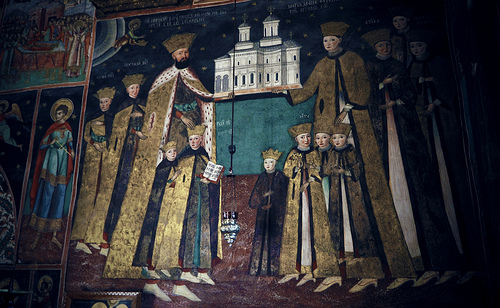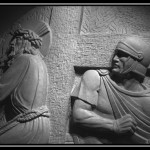We run our website the way we wished the whole internet worked: we provide high quality original content with no ads. We are funded solely by your direct support. Please consider supporting this project.

The Problem with Mixing Church & Government
Image by fusion-of-horizons via Flickr
Some people insist that the only reason that neither Jesus nor anyone else in the first several centuries of the church tried to dominate the political system of their day was because they were a small minority of people living in a nondemocratic and hostile environment. By contrast, the argument goes, American Christians are a sizable group living in a rather friendly, democratic land, and we are able to at least improve, if not someday dominate, our government and culture. And since to whom much is given much is required (Lk 12:48), do we not have a spiritual and moral obligation to use this opportunity to the full advantage of the kingdom of God? In this light, the argument concludes, to shirk the opportunity to rule because we are afraid of compromising our kingdom calling is irresponsible, pharisaical, and cowardly. The argument seems to make so much sense.
The church during the time of Constantine explained away the self-sacrificial love and humility of Jesus and the early church in just this fashion. Instead of constituting the essence of the kingdom of God, the self-sacrificial and humble example of Jesus and the early church was understood to be merely a provisional inconvenience. Now that God had supposedly given the church power to rule, they reasoned, it just made sense to use it. For they, being the people who knew the truth, obviously knew best how to rule others.
Yet what did this line of reasoning accomplish? It produced centuries of barbaric bloodshed—in Jesus’ name. Beyond the tragedy of millions of people being brutally murdered, the fact that this was done under the banner of the cross has harmed global missions for centuries. And the church lost its power along the way.
Whenever Christians have gotten what so many American evangelicals today are trying to get—namely, the power to enforce their righteous will on others—it eventually harms the church as well as the culture. The lesson of history, a lesson the Devil has known all along, is this: The best way to defeat the kingdom of God is to empower the church to rule the kingdom of the world—for then it becomes the kingdom of the world! The best way to get people to lay down the cross is to hand them the sword!
The kingdom of God is not about coercive “power over,” but influential “power under.” Its essence is found in the power to transform lives from the inside out through love and service.
When kingdom-of-God citizens aspire to acquire Caesar’s authority to accomplish “the good,” we sell our kingdom birthright for a bowl of worldly porridge (Gen 25). To the extent that we pick up the sword, we put down the cross. When our goal as kingdom people becomes centered on effectively running a better version of the kingdom of the world, we compromise our calling to be faithful to the kingdom of God.
—Adapted from The Myth of a Christian Nation, pages 93-95.
Category: General
Tags: Church, Constantine, Government, Myth of a Christian Nation, Politics, Power
Topics: Ethical, Cultural and Political Issues
Related Reading

Politics & the Kingdom of the World
Instead of aligning any version of the kingdom of this world with the kingdom of God—as is common in American Christianity—kingdom-of-God participants must retain a healthy suspicion toward every version of the kingdom of this world. This is especially necessary regarding one’s own version because that’s precisely where we’re most tempted to become idolatrous (see…

Why NO Violence in Jesus’ Name is Justified
Image by papapico via Flickr On Friday, Greg posted a response to Obama’s speech about religiously-inspired violence. Here are some further thoughts on why violence in the name of Jesus—no matter whether we call it just, redemptive, or defending ourselves—is just another form of kingdom-of-this-world living. The love we are called to trust and emulate is supremely…

Lighten Up: Election Season Blues
It’s a little sad (but still pretty funny) that there are actual campaign posters similar to this one. The next time you get fed up or discouraged with all the over-the-top election ads, you might want to browse through these for a chuckle. And remember that our hope is not located in any election. Thank…

How the Church is Tempted to “Do Good”
The previous post spoke of God’s call to the church to be resident aliens: a holy, distinct people who are set apart and peculiar when compared to the patterns of the world. The holiness of God’s kingdom is cruciform love, which constitutes our distinct witness to the world. Preserving this holiness and resisting the Devil’s…

Don’t Wilberforce’s achievements refute your stance on the separation of faith and politics?
Question: William Wilberforce was a Christian whose passionate involvement in politics almost single-handedly brought an end to the slave trade in 19th century England. Don’t his achievements show the importance of Christians being involved in politics, thus refuting your contention that Christian’s should keep their faith and values separate from politics? Answer: First, while I…

Jesus & Racial Reconciliation
Lorenia via Compfight If you were to read an account today of a white man offering his front row seat on a public bus to an elderly African American lady, you’d probably think this was a nice gesture, but nothing more. However, if you learned that the event happened in Birmingham Alabama in 1955, you’d…
